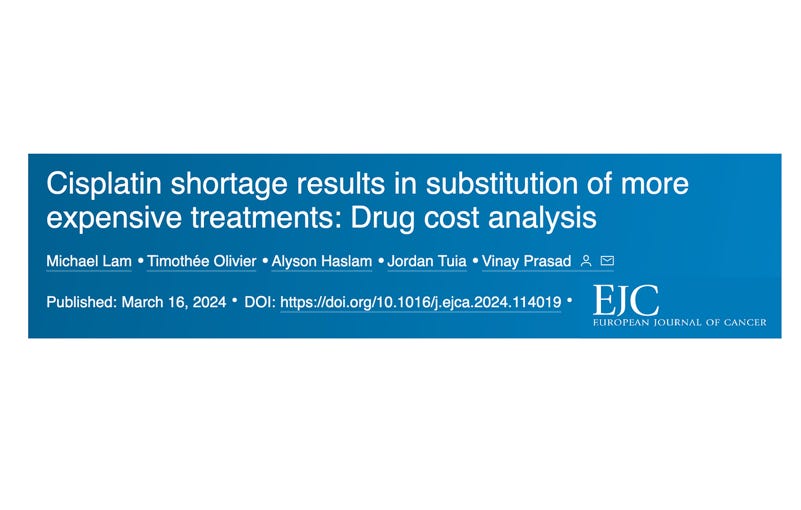Cisplatin shortage... has costs beyond loss-of-efficacy!
The high costs associated with shortages of old and cheap drugs.
Absolutely no one benefits from drug shortages for critical drugs like cisplatin. Except… drug companies can profit by selling costly alternative treatments.
In a report we published in the European Journal of Cancer, we analyzed the cost of alternative treatments in cases of platinum shortage recommended by the American Society of Clinical Oncology (ASCO).
The study
We examined 41 cancer treatment regimens from 3 tumor types (head and neck, small cell lung, and urothelial cancers). The average cost of a regimen containing cisplatin across tumor types was $30,656 and the average cost of a substitution regimen across tumor types was $77,599. The alternative treatment regimen, on average, cost $46,943 MORE.
Platinum agents like cisplatin and carboplatin were in a dire shortage for a majority of 2023. During this time, the lack of cisplatin had a detrimental impact on cancer patients and the broader healthcare system. While most discussions of the shortage centered on supply chain and patient care issues, we delved into the financial ramifications of substituting cisplatin with costly alternative treatments. We illuminated how these alternatives not only came with a hefty price tag but also may not have matched the clinical efficacy of cisplatin-containing regimens.
Issues related to shortages
Following the ASCO recommendation of using a costly alternative treatment when cisplatin is unavailable could open the floodgates for doctors to experiment with new cancer regimens. That could lead to a number of potential issues within healthcare:
Higher Costs: we highlighted that the alternative treatment cost nearly $47,000 more on average. This financial toxicity falls on patients, insurers, and the healthcare system as a whole.
Variable Efficacy: some of these alternative treatment regimens were approved without established overall survival data. Newer drugs may not always have comparable established clinical efficacy to existing platinum containing treatments.
Deviating from Evidence-Based Practice: Relying on newer drugs without a strong foundation of clinical trials and evidence may result in less adherence to evidence-based practices, which could impact the quality of care patients receive.
Overuse of Expensive Treatments: clinicians who become accustomed to using costly drugs may inadvertently overprescribe them, especially if there is a pharmaceutical company influence such as direct to consumer marketing. This could create a cycle where more expensive options become the norm even when less costly, equally effective treatments are available.
Beyond cisplatin…
Cisplatin is only one example. I have no doubt that some of these high cost drugs gained market share and benefited from the dire drug shortage. There are a number of inexpensive, old, generic cancer drug regimens that have much more expensive alternative treatments if they were to go on shortage.
For example, if vincristine goes on shortage, many clinicians might use Polivy (polatuzumab vedotin-piiq) in the pola-R-CHP regimen instead of the standard R-CHOP for DLBCL. Perhaps if Genentech is reading, they might try to buy out all of the vincristine to drive up market share for polatuzumab.






Thank you for publishing this!